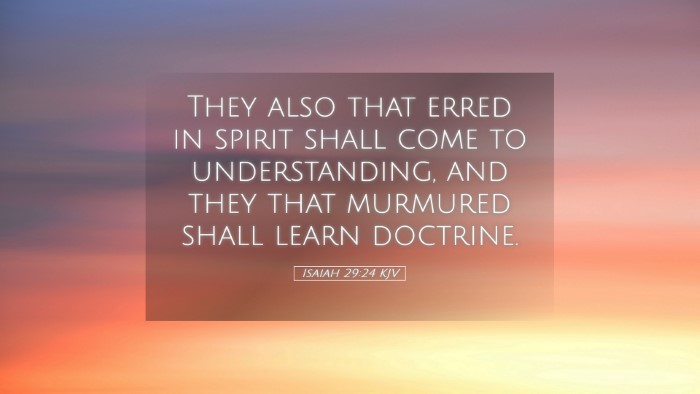Commentary on Isaiah 29:24
Isaiah 29:24 (KJV): "They also that erred in spirit shall come to understanding, and they that murmured shall learn doctrine."
Introduction
The book of Isaiah captivates the reader with its profound messages and themes of judgment and restoration. In Isaiah 29:24, we find a significant promise of transformation for those who have strayed from the path of righteousness. This commentary seeks to unravel the depths of this verse using insights from public domain commentaries by Matthew Henry, Albert Barnes, and Adam Clarke.
Contextual Overview
Isaiah addresses the people of Judah during a time of imminent danger and moral decay. The profound darkness represented not only geopolitical threats but also spiritual blindness that had overtaken the nation. This verse culminates a brief but important thought regarding the spiritual renewal and enlightenment which would come to those who had previously wandered.
1. Historical Background
Matthew Henry notes that Isaiah prophesies against the spiritual dullness of the people, invoking God's judgment as a corrective measure. The overarching theme throughout Isaiah is God’s sovereignty, even amidst Israel's disobedience, hinting at hope and restoration through divine intervention.
2. The Condition of God’s People
Albert Barnes emphasizes the significance of erring in spirit. The original Hebrew term implies a deviation from truth or an error in judgment. It signals a state in which the individuals have wandered from the guiding principles laid out by God. The “murmurers” are indicative of a broader discontent and rebellion against God’s plan.
Verse Analysis
1. “They that erred in spirit”
This phrase encapsulates a profound truth about human nature. The use of the term 'erred' suggests not just a lapse but an ongoing condition of misunderstanding. Adam Clarke expounds that this erring reflects a lack of spiritual insight, which can only be resolved through divine revelation and guidance.
2. “Shall come to understanding”
The promise here is restorative in nature. The term ‘understanding’ speaks to a deep, spiritual knowledge that transcends mere intellectual comprehension. Henry suggests that this enlightenment is a gracious act from God, implying that those who once strayed will be granted eyes to see and ears to hear the truth of God's Word.
3. “They that murmured”
To murmur is often indicative of hidden grievances and saturated discontent. As Barnes articulates, murmuring reveals a lack of faith and trust in God's plan. It is an expression of insubordination against God's purposes, often leading to further spiritual blindness.
4. “Shall learn doctrine”
This aspect of the verse is particularly fascinating, as it denotes an active learning process. Clarke remarks that the path to understanding requires engagement with doctrine and truth. It suggests a move from passive discontent to active participation in the teachings of God, underlining the transformative power of divine instruction.
Theological Implications
Isaiah 29:24 highlights several crucial theological insights.
- Grace and Restoration: The promise of understanding signifies divine grace, reminding the believer that even those who err can return to a place of knowledge and understanding.
- The Role of Doctrine: This verse emphasizes the importance of sound teaching and doctrine in spiritual growth. Doctrine is not merely for academia but critical to faith and one’s relationship with God.
- Hope for the Wayward: The hope presented in the prophecy serves as a reminder that no one is beyond the reach of God’s transformative power. This provides encouragement to anyone struggling with spiritual apathy or rebellion.
Practical Applications
Understanding this verse presents numerous practical applications for pastors, students, theologians, and scholars.
- Preaching Restoration: Pastors and preachers are called to deliver messages that offer hope and restoration to those who have strayed from God’s truth.
- Engaging in Doctrine: The emphasis on learning doctrine invites students and scholars to delve deeper into biblical teachings, recognizing their importance for spiritual health.
- Encouragement in Ministry: Ministry leaders can take heart knowing that God is at work transforming lives, encouraging them to provide a welcoming space for the struggling and wayward.
Conclusion
Isaiah 29:24 is a beacon of hope, affirming that those who have erred will find understanding and those who murmured will learn doctrine. The insights compiled from Matthew Henry, Albert Barnes, and Adam Clarke help elucidate this profound promise. This passage serves as a reminder of God’s relentless pursuit of His people, calling them back to understanding and teaching—the very core of Christian faith and practice.


